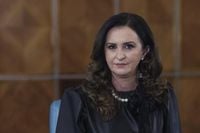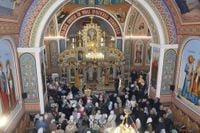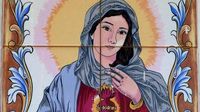On March 27, 2025, the Holy Synod of the Romanian Orthodox Church (BOR) acknowledged the desire of some Romanian Orthodox communities in Ukraine to return to the Romanian Orthodox Church. This significant decision comes amid recent efforts by believers and priests from the Chernivtsi region, who have expressed their wish to reconnect with the BOR. Social media has seen the emergence of an initiative group comprising local community members supporting this action.
According to Basilica.ro, the Holy Synod noted with hope and blessing the desire of these Romanian Orthodox communities in Ukraine to return to the Romanian Orthodox Church. The situation dates back to August 2024 when three religious organizations in Ukraine convened the Constituent Assembly of the Romanian Orthodox Church in Ukraine on August 25 in Chernivtsi. Subsequently, on August 28, these organizations submitted the necessary documentation for the legal registration of the Romanian Orthodox Church in Ukraine to the State Service for Ethnic Policies and Freedom of Conscience.
However, despite nearly seven months passing since the submission of these documents, Ukrainian authorities have yet to provide an official response regarding the registration of this religious structure. In October 2024, the BOR expressed regret over the delay in the legal recognition of the Romanian Orthodox Church in Ukraine, emphasizing that it meets all conditions imposed by Ukrainian legislation. The Holy Synod also approved the continuation of efforts toward public authorities in Romania and Ukraine to resolve this situation.
On February 28, 2025, the initiative group for the registration of the BOR in Ukraine appealed to President Volodymyr Zelenski for intervention to unblock the recognition process. In this context, Ciprian-Vasile Olinici, the Secretary of State for Cults in the Romanian Government, met with Victor Elenski, the head of the State Service of Ukraine for Ethnic Policies and Freedom of Conscience (DESS), to discuss the delayed legal recognition of the Romanian Orthodox Church in Ukraine.
Ukrainian authorities have expressed skepticism regarding the establishment of the Romanian Orthodox Church in Ukraine by the BOR. The State Service of Ukraine for Ethnic Policy and Freedom of Conscience proposed creating a structure for Romanians within the Orthodox Church of Ukraine (OCU). However, the Romanian community in Ukraine does not support this idea, believing that, spiritually, they are closer to the Romanian Orthodox Church than to the OCU.
Currently, Romanian Orthodox people in Ukraine are grouped into 130 parishes. Among these, three are registered as autonomous under the canonical jurisdiction of the Diocese of Southern Bessarabia of the Metropolis of Bessarabia, while 127 parishes fall under the jurisdiction of the Ukrainian Orthodox Church (UOC), which split from the Moscow Patriarchate in May 2022. A survey conducted in the autumn of 2024 by the Institute of Political Studies and Social Capital in Chernivtsi revealed that 72.6% of Romanian speakers in Ukraine support the initiative of the Romanian Orthodox Church to create a church structure for ethnic Romanians in the Chernivtsi, Transcarpathian, and Odessa regions.
Interestingly, 16.4% of Romanian speakers in Ukraine remain unaware of this initiative, while only 6% oppose it. A significant 71.2% of respondents indicated that they believe Ukrainian authorities could create obstacles to the establishment of the Romanian Orthodox Church in Ukraine. Additionally, 50% of ethnic Romanians anticipate impediments from other church structures in Ukraine, such as the UOC and the Autocephalous Orthodox Church of Ukraine. Potential obstacles from local parishioners and priests were mentioned by 37% of respondents, while only 11% believe there are no obstacles to this endeavor.
In a separate but related development, Minister of Culture Natalia Intotero responded on March 28, 2025, to the controversy surrounding the play “The Prophet Elijah,” staged at the National Theater Bucharest (TNB) and criticized by the Romanian Patriarchate. Intotero stated that a secretary of state from the Ministry of Culture will be involved in resolving the incident.
On March 27, Intotero had a discussion with the director of the National Theater and requested a public explanation, which was subsequently provided through a press release. She emphasized that the cultural domain should unite rather than divide people, especially during these challenging times for Romanians. Notably, changes are occurring within the Ministry of Culture, with a new secretary of state, Demeter Andras, set to take over responsibilities from Mădălin Voicu.
The Romanian Patriarchate has also intervened, expressing concern over the “defamatory use of Christian religious symbols” in the play. They stated, “Respect for Christian symbols is both a spiritual and cultural act that is important and necessary in an increasingly secularized world.” The Patriarchate hopes that future cultural manifestations will continue to respect the sacred dimension of these symbols.
In response to public reports on social media, representatives from TNB stated that the show “The Prophet Elijah” does not intend to offend the Christian faith or any other religious beliefs. They explained that the production serves as a reflection on faith, the fragility of human beliefs, and the dangers of extremism. The theater aims to encourage tolerance, dialogue, and a deeper understanding of the complexities of the human spirit.
In conclusion, the Romanian Orthodox Church's acknowledgement of the desire for reconnection among Romanian communities in Ukraine and the ongoing cultural controversies highlight significant issues facing both religious and artistic expressions in Romania today. As communities navigate these challenges, the outcomes may shape the future landscape of faith and culture in the region.






